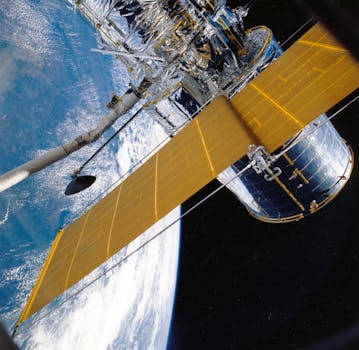
GEO Satellites: Understanding the Technology and Applications
GEO satellites, or Geostationary Earth Orbit satellites, are a type of satellite that orbits the Earth at an altitude of approximately 36,000 kilometers. They are stationed above the equator, and their orbit is synchronized with the Earth’s rotation, allowing them to remain fixed in the sky. GEO satellites play a crucial role in modern telecommunications, providing global coverage and enabling a wide range of applications, including telecommunications, broadcasting, weather forecasting, and navigation.
The technology behind GEO satellites is complex and involves a range of components, including the satellite itself, the launch vehicle, and the ground control system. The satellite is equipped with a range of instruments, including transponders, antennas, and solar panels, which enable it to receive and transmit signals. The launch vehicle is used to launch the satellite into orbit, and the ground control system is used to monitor and control the satellite’s operations.
Applications of GEO Satellites
GEO satellites have a wide range of applications, including telecommunications, broadcasting, weather forecasting, and navigation. In the field of telecommunications, GEO satellites are used to provide internet connectivity, telephone services, and data transmission. They are particularly useful in remote or underserved areas where terrestrial infrastructure is limited or non-existent. In broadcasting, GEO satellites are used to distribute television channels and radio programs to a wide audience. They are also used in weather forecasting, providing images and data that help meteorologists predict weather patterns and issue warnings.
In addition to these applications, GEO satellites are also used in navigation, providing location information and timing signals that enable GPS and other navigation systems to function. They are also used in scientific research, providing data and observations that help scientists understand the Earth’s climate, geology, and natural resources.
Benefits and Challenges of GEO Satellites
The use of GEO satellites offers a range of benefits, including global coverage, high bandwidth, and reliability. They are particularly useful in areas where terrestrial infrastructure is limited or non-existent, providing connectivity and access to information and services. However, there are also challenges associated with the use of GEO satellites, including the high cost of launch and operation, the risk of satellite failure, and the potential for interference and congestion.
Despite these challenges, the use of GEO satellites is expected to continue to grow, driven by the increasing demand for telecommunications and other services. The development of new technologies, such as high-throughput satellites and advanced propulsion systems, is also expected to improve the efficiency and effectiveness of GEO satellites.
Future of GEO Satellites
The future of GEO satellites is exciting and rapidly evolving. With the increasing demand for telecommunications and other services, the use of GEO satellites is expected to continue to grow. The development of new technologies, such as high-throughput satellites and advanced propulsion systems, is also expected to improve the efficiency and effectiveness of GEO satellites.
In addition, there are a range of new applications and services that are being developed, including satellite-based internet services, such as SpaceX’s Starlink and Amazon’s Kuiper Systems. These services are expected to provide high-speed internet connectivity to remote and underserved areas, and to enable a range of new applications and services, including online education, telemedicine, and e-commerce.
